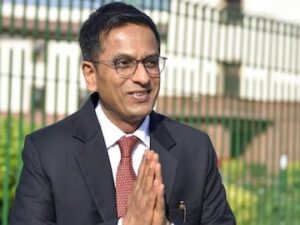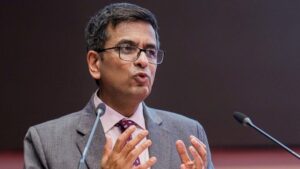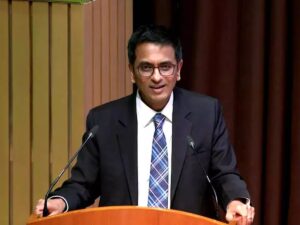Like any other retired CJI – Justice D.Y. Chandrachud, has also some limitations regarding practice before the Supreme Court. The first limitation is that no Chief Justice, or a Judge of the Supreme Court after he serves his term, has the right to practice in any court in India. This rule preserves the standards of the judiciary to avoid conflict of interest because most of those former judges have power because of their previous status.
In any case, retired CJIs and Supreme Court judges may be qualified for other important positions in public and judiciary. Sometimes they also work on commissions, tribunals, or as the third party in dispute cases.
Many CJIs move to the bars or benches and sit on policy advisory committees or chairmanship of public inquiry, where they know the law and constitution. Besides, they can work as heads of prestigious institutions such as the National Human Rights Commission (NHRC) or as ombudsmen in judicial-headed organizations.

These roles enable former justices to contribute to public life, and they still bear the ethical requirements of the judiciary. Justice Chandrachud, the applicant with a liberal orientation and a commitment to constitutionalism as a career, is well suited to continue delivering public service or advisory and academic work, adding value to the delivery of justice in society.
Know The Reason
The regulation of the formation of law practice immediately after retirement from the Supreme Court is anchored on the principles of avoidance of conflict of interest in the judicial system. This restriction is supported by ethical considerations by Article 124 of the Indian Constitution which prescribes judicial standards, including inter alia, lifetime employment for judges. Such a rule is expected to avoid conflict of interest, promote impartiality, and maintain the independence of the judiciary from the court users.
Ensuring Judicial Integrity and Impartiality
To protect the judiciary from accusations, retired Supreme Court judges are barred from practicing law. Their post-retirement respect and authority could improperly influence court proceedings. This restriction aims to prevent any undue influence by retired justices, ensuring the impartiality of the justice delivery system.

Article 124: Judicial Independence
According to Article 124 of the Indian Constitution, the judiciary of India stands independent. In this article, the appointment, term of office, and remuneration of members of the Supreme Court is discussed. Therefore the judiciary waives the right for former judges to practice, emphasizing the notion that judges cannot be influenced by their subsequent careers or the future of the courts. It was to eliminate cases where a judge may make a decision influenced by the fact that; he or she will be employed by that specific court in the future as a way of boosting judicial independence.
Avoiding potential conflicts of interest
Proficient Supreme Court judges make decisions in critical and complex matters that encompass the most common legal issues that affect governments, big firms, or well-reputed personalities. There was the potential of certain Judges if returned to practice getting themselves entangled with conflicts of interest in case they may have faced while in practice. It is possible to point out positions in which, in any manner, former judges may influence the situation and get involved in judgments or cases where the parties are involved, which can be disadvantageous. Such a prohibition helps to avoid a situation in which judges are faced with certain events that may create personal or professional prejudice to legal relations.
Maintaining Public Confidence
People will only trust their judiciary to the extent that their judiciary is considered strong. It might be perceived that justice is now being sold by former Supreme Court justices who are now allowed to practice law to those clients whom they used to serve on the bench. To ensure no such dilution happens, retired judges cannot practice in any case effectively ensuring that the public maintains its trust in the judiciary as an independent organ whose main function is to dispense justice. This restriction shows the court and ethical conduct to the society hence enhancing the society’s perception towards the judiciary.

Public Service Alternatives
However, based on this restriction, myriad other opportunities are available to retired Supreme Court judges. They often join different commissions, and tribunals or occupy some positions in different organizations like NHRC or Law Commission. These positions enable them to remain useful in giving their knowledge in serving the public without biases of judicial impartiality.
To sum up, excluding Supreme Court justices from practicing law on a retirement base is a measure taken to maintain the independence, integrity, and neutrality of the Indian Supreme Court as provided by Article 124 of the Constitution. This restriction keeps the general public in check while affording the judges other ways to remain useful to society
